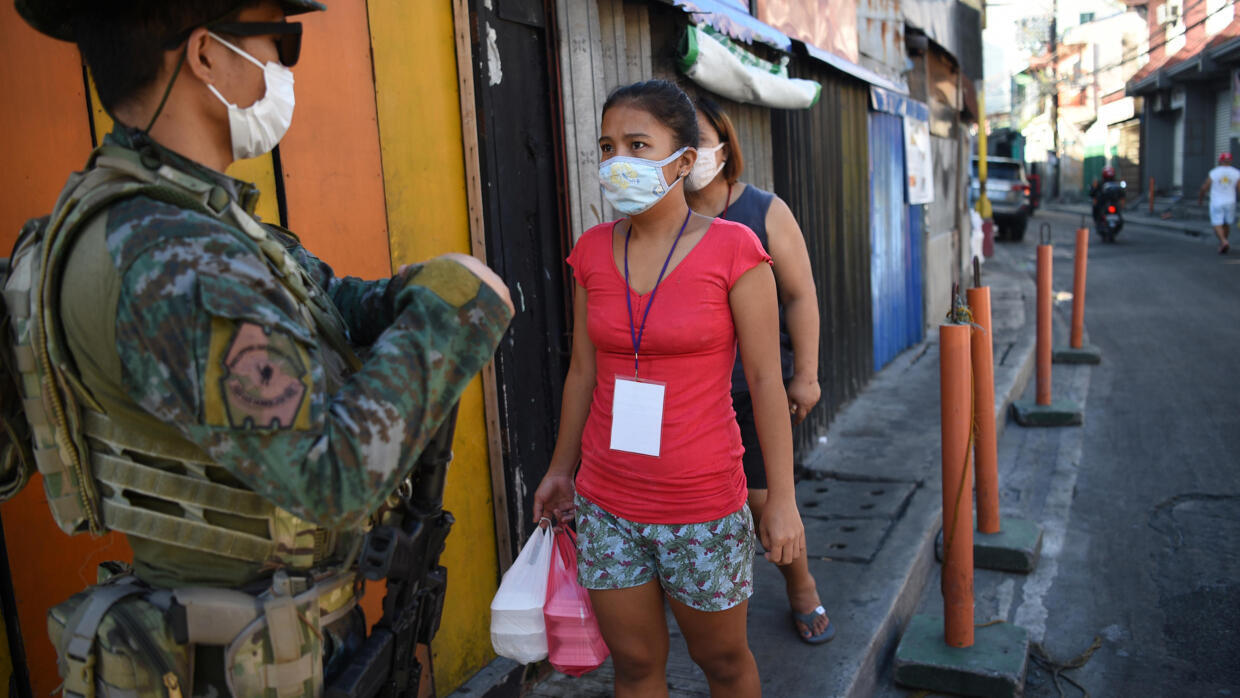
Millions of people in the Philippines were ordered to stay home Tuesday as global coronavirus infections kept soaring, with the World Health Organization warning against relying on a vaccine "silver bullet" to end the pandemic.
More than 18 million people worldwide have been infected with the virus since it first emerged in China late last year and it shows no sign of slowing down.
Desperate to contain the spread and relieve pressure on overwhelmed hospitals, some countries such as the Philippines have resorted to reimposing economically painful restrictions on travel and businesses.
Commuter trains, buses and other public vehicles stayed off the main roads of the capital Manila on Tuesday and police were again staffing checkpoints to restrict public travel as surging virus cases forced another lockdown.
Officials deployed dozens of shuttle buses, along with army trucks, to ferry stranded medical personnel and workers of authorised businesses. Most domestic flights to and from the capital were cancelled, and night curfews will return in places.
President Rodrigo Duterte agreed to reinstate the lockdown after medical groups warned the health care system was being overwhelmed by Covid-19 patients. More than 106,000 people have been infected, including more than 2,100 who have died.
More than 27 million people on the main island of Luzon, which includes Manila, are expected to remain under lockdown for weeks. With only 24 hours' notice of the shutdown, many found themselves stranded in the capital and unable to get back to their hometowns.
"We've run out of money. We can't leave the airport because we don't have any relatives here," said Ruel Damaso, a 36-year-old construction worker trying to return to the southern city of Zamboanga.
"We will have to stay here for two weeks until we get our flights back."
The lockdown is milder than the one imposed earlier this year, which largely confined most people to their homes for weeks, but is more severe than the quarantine restrictions the capital had been under recently.
Businesses previously allowed to partly reopen, including barbershops, gyms, dine-in restaurants and tourist destinations, have been ordered shut. Authorised companies including banks, health and food processing firms must shuttle their employees between home and work.
Vaccine 'silver bullet'
Despite months of crippling restrictions, the pandemic is gathering pace in regions across the globe, with the worldwide death toll nearing 700,000.
Brazil is driving a surge in Latin America and the Caribbean where infections have topped five million. South America's largest country has recorded 2.75 million cases, and close to half the region's more than 202,000 deaths.
Only the United States has been worse affected, with the number of fatalities surpassing 155,000.
Hopes of ending the current cycle of outbreaks and lockdowns rest largely on a vaccine, with research labs around the world locked in a race against time.
Russia said Monday it aimed to launch mass production of a vaccine in September and turn out "several million" doses per month by next year.
But Vitaly Zverev, laboratory chief at the Mechnikov Research Institute of Vaccines and Sera, said it was "impossible to ensure a vaccine's safety in the time that has passed since the beginning of this pandemic".
The WHO warned that governments and citizens should focus on what is known to work: testing, contact tracing, maintaining physical distance and wearing a mask.
"We all hope to have a number of effective vaccines that can help prevent people from infection," WHO chief Tedros Adhanom Ghebreyesus told a virtual press conference.
"However, there's no silver bullet at the moment — and there might never be."
Despite rising infection numbers in Europe, some countries are pushing ahead with plans to reopen schools and finding ways to keep their battered tourism sectors functioning.
Germany watched anxiously Monday as 150,000 children returned to school in Mecklenburg-Western Pomerania, the country's first state to restart full-time classes after the summer holidays.
In France, Prime Minister Jean Castex urged the nation "not to let down its guard" as surging cases led the Riviera resort city of Nice to become the latest to mandate outside mask-wearing.
"The virus has not gone on holiday and neither have we," Castex said.
(FRANCE 24 with AFP, AP)







